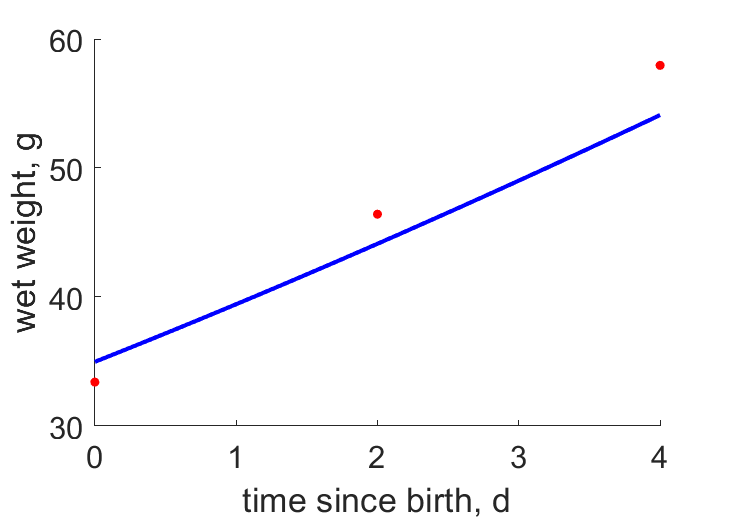Predictions & Data for this entry
| Model: std | climate: MC, ME | migrate: Ml | phylum: |
| COMPLETE = 2.3 | ecozone: MS, MC | food: biCvf, biCic, biCik, bjSv | class: |
| MRE = 0.032 | habitat: 0iMc | gender: Dg | order: |
| SMSE = 0.002 | embryo: Tncfm | reprod: O | family: |
Zero-variate data
| Data | Observed | Predicted | (RE) | Unit | Description | Reference |
|---|---|---|---|---|---|---|
| ab | 45 | 45.09 | (0.002042) | d | age at birth | Wiki |
| tx | 49 | 49.47 | (0.009534) | d | time since birth at fledging | Wiki |
| tp | 147 | 139.6 | (0.0502) | d | time since birth at puberty | guess |
| tR | 730 | 730 | ( 0) | d | time since birth at 1st brood | guess |
| am | 7300 | 7477 | (0.02429) | d | life span | Wiki |
| Wwb | 33.4 | 34.96 | (0.0468) | g | wet weight at birth | Amun1995 |
| Wwi | 460 | 490.7 | (0.06678) | g | ultimate wet weight | HoduWeat2003 |
| Ri | 0.00274 | 0.002705 | (0.0127) | #/d | maximum reprod rate | Wiki |
Uni- and bivariate data
| Data | Figure | Independent variable | Dependent variable | (RE) | Reference |
|---|---|---|---|---|---|
| tW |  | time since birth | wet weight | (0.05598) | Amun1995 |
Pseudo-data at Tref = 20°C
| Data | Generalised animal | Pagodroma nivea | Unit | Description |
|---|---|---|---|---|
| v | 0.02 | 0.03306 | cm/d | energy conductance |
| p_M | 18 | 2607 | J/d.cm^3 | vol-spec som maint |
| k_J | 0.002 | 0.1161 | 1/d | maturity maint rate coefficient |
| k | 0.3 | 0.3253 | - | maintenance ratio |
| kap | 0.8 | 0.8921 | - | allocation fraction to soma |
| kap_G | 0.8 | 0.8023 | - | growth efficiency |
| kap_R | 0.95 | 0.95 | - | reproduction efficiency |
Discussion
- Feeding is reduced towards end of nestling period; the intially reduced growth can also be due to lower body temperature
- Body temperature is guessed
- mod_1: Pseudo-data point k is used, rather than k_J; Data set tp and parameter t_R are added, the latter replacing clutch interval t_N. Postnatal T is based on PrinPres1991, see get_T_Aves. See further the revision page, theme puberty
Acknowledgment
- The creation of this entry was support by the Norwegian Science Council (NFR 255295)
Bibliography